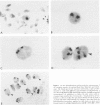Abstract
Testicular germ cell tumors can be prevented if the neoplasia is diagnosed at the stage of carcinoma in situ (CIS). Hyperdiploid DNA content is one of the markers of CIS germ cells. We developed a noninvasive procedure for detection of CIS of the testis by means of a nonradioactive in situ hybridization assay with a probe for chromosome 1. Seminal cytospin smears from 2 men with isolated CIS changes, from 6 men in whom CIS was combined with a tumor, and from 16 control men without evidence of testicular neoplasia were tested. Ejaculates from men with CIS contained on average 2.6% hyperdiploid cells, whereas the corresponding percentage in the smears from controls was 0.2 (P = 0.009). In a blind study we identified samples from both patients with isolated CIS changes and from 3 of the 6 men in whom CIS was accompanied by a tumor, based on the percentage of the hyperdiploid cells. No false-positive results were obtained. Thus this study confirmed findings of previous immunocytochemical and flow cytometric studies that indicated exfoliation of CIS germ cells into seminal fluid. For detection of aneuploid cells in semen, in situ hybridization may be a more sensitive technique than flow cytometry. Applied on seminal samples, in situ hybridization may become a valuable and fast tool for diagnosis of CIS and thereby for prevention of testicular cancer.
Full text
PDF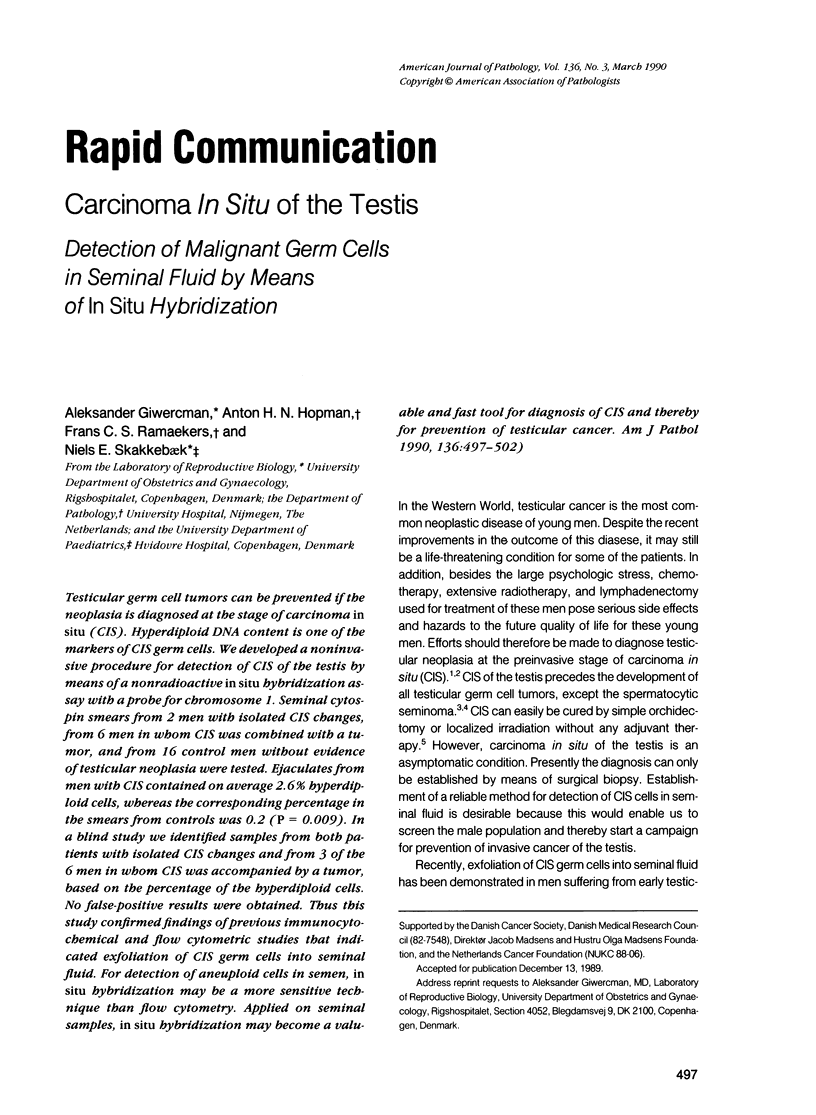
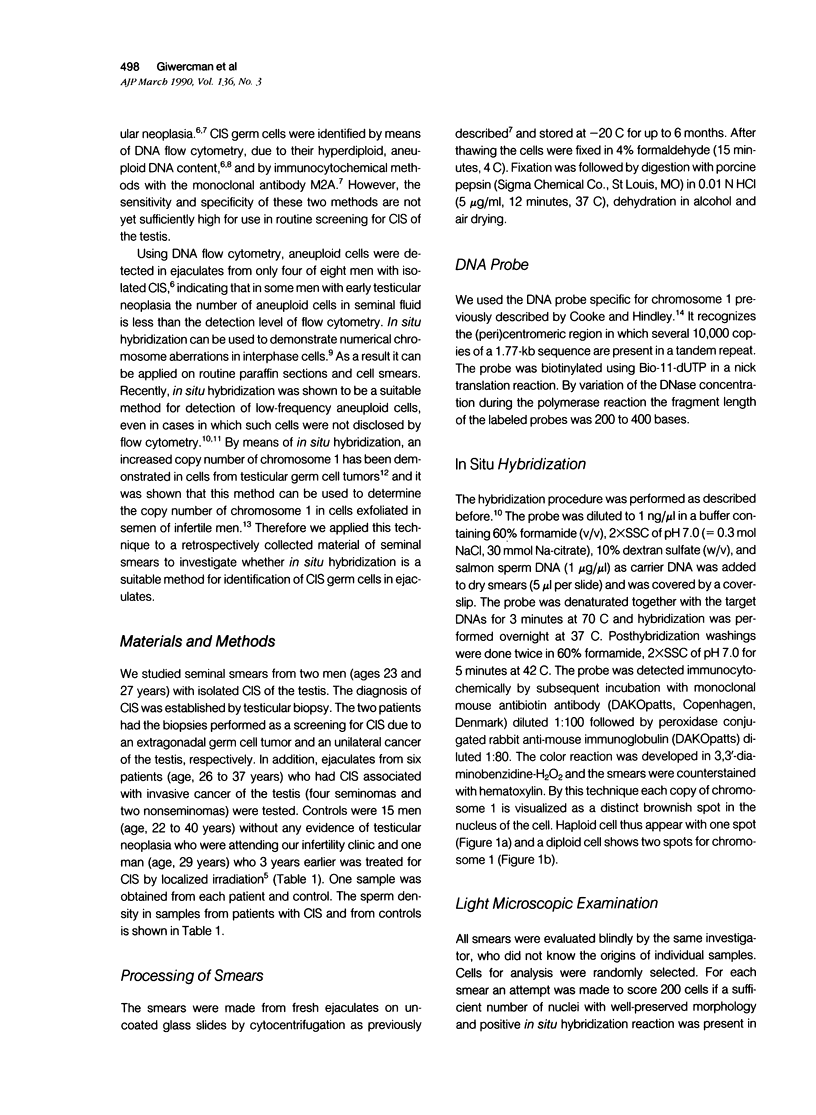
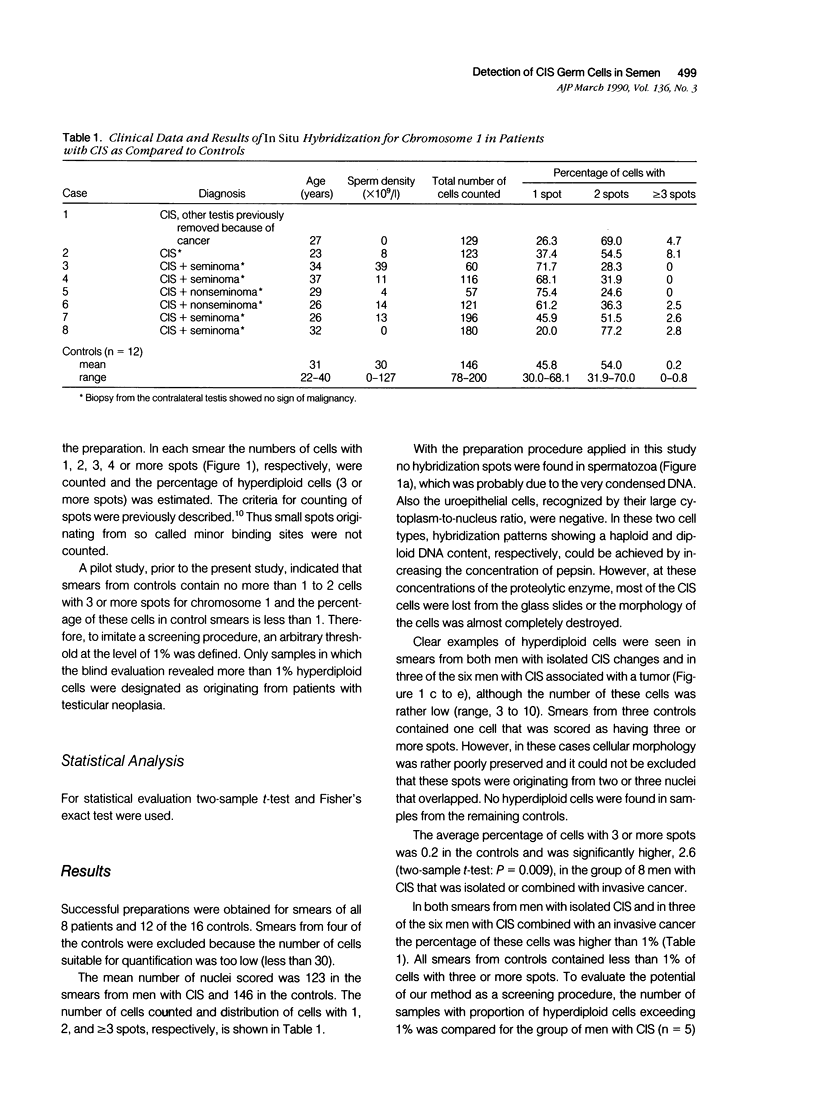
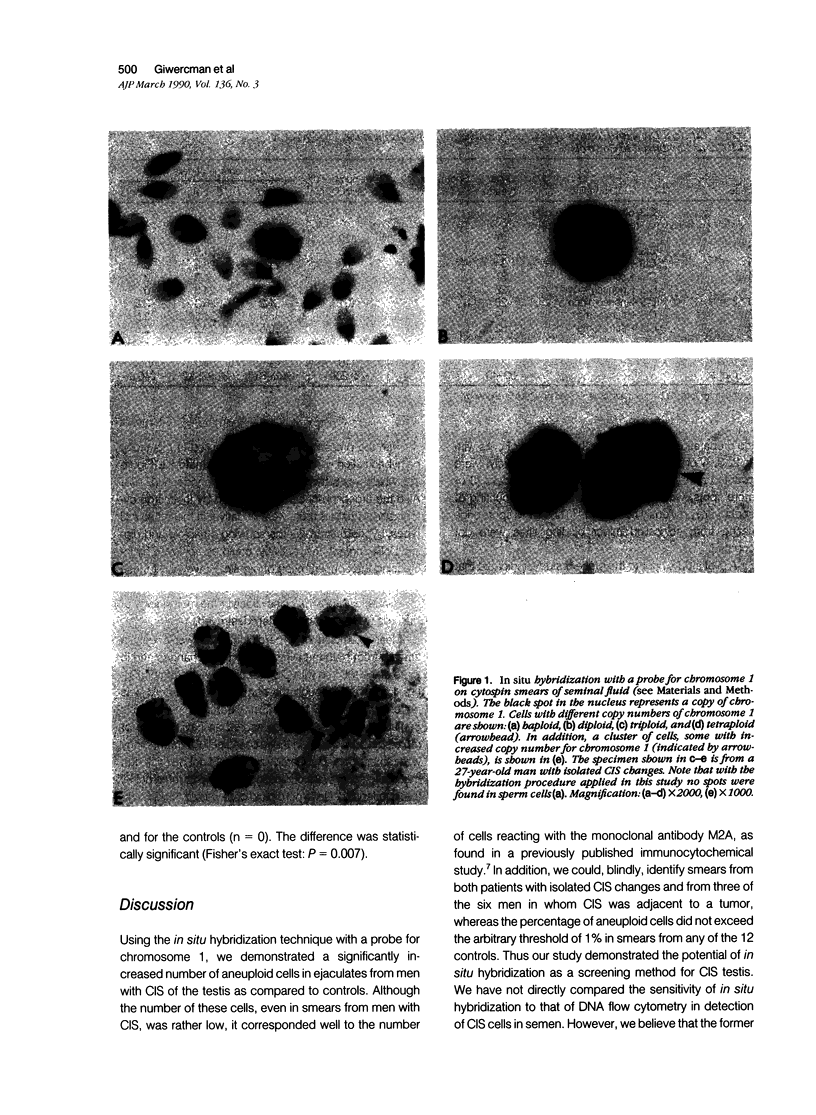
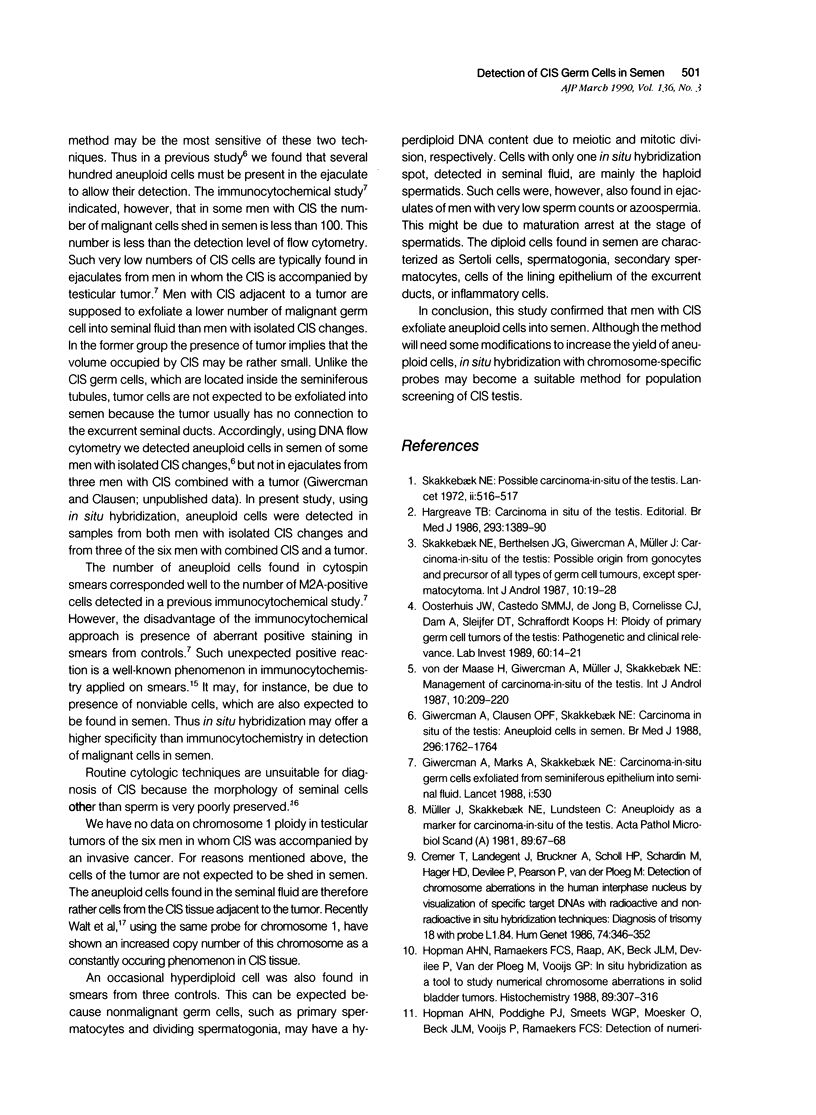
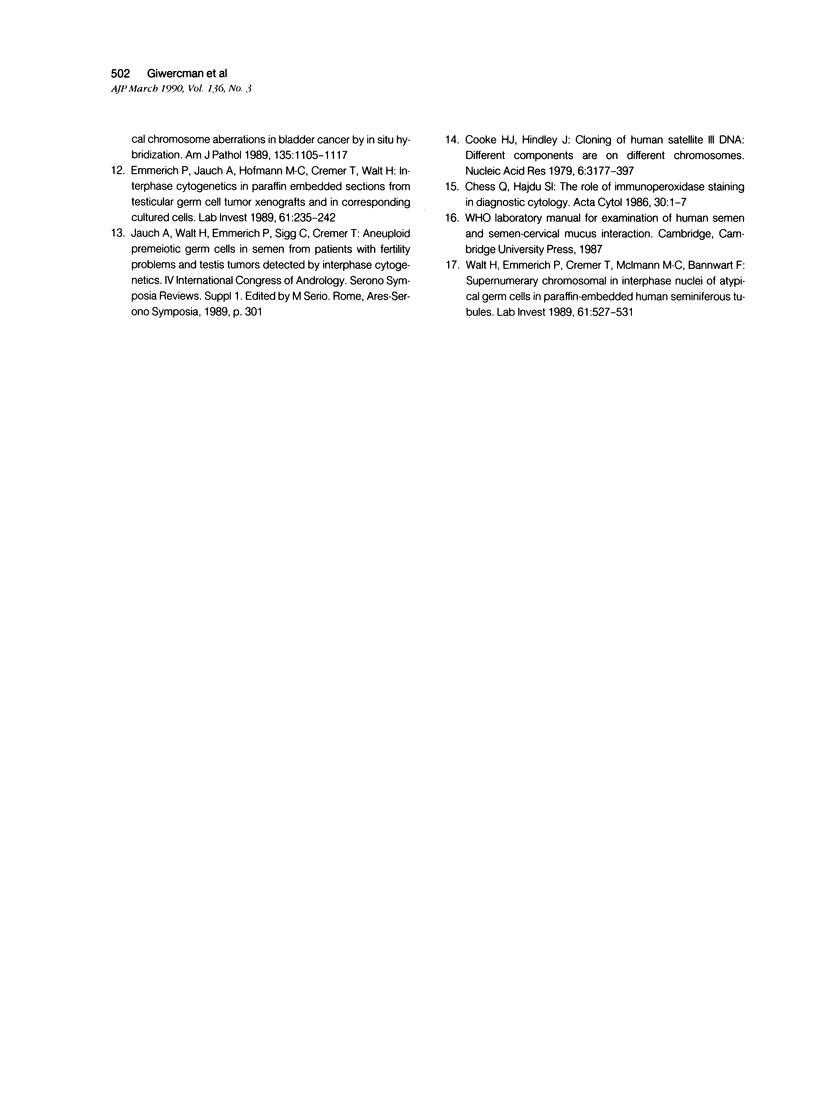
Images in this article
Selected References
These references are in PubMed. This may not be the complete list of references from this article.
- Chess Q., Hajdu S. I. The role of immunoperoxidase staining in diagnostic cytology. Acta Cytol. 1986 Jan-Feb;30(1):1–7. [PubMed] [Google Scholar]
- Cooke H. J., Hindley J. Cloning of human satellite III DNA: different components are on different chromosomes. Nucleic Acids Res. 1979 Jul 25;6(10):3177–3197. doi: 10.1093/nar/6.10.3177. [DOI] [PMC free article] [PubMed] [Google Scholar]
- Cremer T., Landegent J., Brückner A., Scholl H. P., Schardin M., Hager H. D., Devilee P., Pearson P., van der Ploeg M. Detection of chromosome aberrations in the human interphase nucleus by visualization of specific target DNAs with radioactive and non-radioactive in situ hybridization techniques: diagnosis of trisomy 18 with probe L1.84. Hum Genet. 1986 Dec;74(4):346–352. doi: 10.1007/BF00280484. [DOI] [PubMed] [Google Scholar]
- Emmerich P., Jauch A., Hofmann M. C., Cremer T., Walt H. Interphase cytogenetics in paraffin embedded sections from human testicular germ cell tumor xenografts and in corresponding cultured cells. Lab Invest. 1989 Aug;61(2):235–242. [PubMed] [Google Scholar]
- Giwercman A., Clausen O. P., Skakkebaek N. E. Carcinoma in situ of the testis: aneuploid cells in semen. Br Med J (Clin Res Ed) 1988 Jun 25;296(6639):1762–1764. doi: 10.1136/bmj.296.6639.1762. [DOI] [PMC free article] [PubMed] [Google Scholar]
- Giwercman A., Marks A., Skakkebaek N. E. Carcinoma-in-situ germ-cells exfoliated from seminiferous epithelium into seminal fluid. Lancet. 1988 Mar 5;1(8584):530–530. doi: 10.1016/s0140-6736(88)91319-0. [DOI] [PubMed] [Google Scholar]
- Hargreave T. B. Carcinoma in situ of the testis. Br Med J (Clin Res Ed) 1986 Nov 29;293(6559):1389–1390. doi: 10.1136/bmj.293.6559.1389. [DOI] [PMC free article] [PubMed] [Google Scholar]
- Hopman A. H., Ramaekers F. C., Raap A. K., Beck J. L., Devilee P., van der Ploeg M., Vooijs G. P. In situ hybridization as a tool to study numerical chromosome aberrations in solid bladder tumors. Histochemistry. 1988;89(4):307–316. doi: 10.1007/BF00500631. [DOI] [PubMed] [Google Scholar]
- Müller J., Skakkeboek N. E., Lundsteen C. Aneuploidy as a marker for carcinoma-in-situ of the testis. Acta Pathol Microbiol Scand A. 1981 Jan;89(1):67–68. doi: 10.1111/j.1699-0463.1981.tb00190.x. [DOI] [PubMed] [Google Scholar]
- Oosterhuis J. W., Castedo S. M., de Jong B., Cornelisse C. J., Dam A., Sleijfer D. T., Schraffordt Koops H. Ploidy of primary germ cell tumors of the testis. Pathogenetic and clinical relevance. Lab Invest. 1989 Jan;60(1):14–21. [PubMed] [Google Scholar]
- Skakkebaek N. E., Berthelsen J. G., Giwercman A., Müller J. Carcinoma-in-situ of the testis: possible origin from gonocytes and precursor of all types of germ cell tumours except spermatocytoma. Int J Androl. 1987 Feb;10(1):19–28. doi: 10.1111/j.1365-2605.1987.tb00161.x. [DOI] [PubMed] [Google Scholar]
- Skakkebaek N. E. Possible carcinoma-in-situ of the testis. Lancet. 1972 Sep 9;2(7776):516–517. doi: 10.1016/s0140-6736(72)91909-5. [DOI] [PubMed] [Google Scholar]
- Walt H., Emmerich P., Cremer T., Hofmann M. C., Bannwart F. Supernumerary chromosome 1 in interphase nuclei of atypical germ cells in paraffin-embedded human seminiferous tubules. Lab Invest. 1989 Nov;61(5):527–531. [PubMed] [Google Scholar]
- von der Maase H., Giwercman A., Müller J., Skakkebaek N. E. Management of carcinoma-in-situ of the testis. Int J Androl. 1987 Feb;10(1):209–220. doi: 10.1111/j.1365-2605.1987.tb00186.x. [DOI] [PubMed] [Google Scholar]



